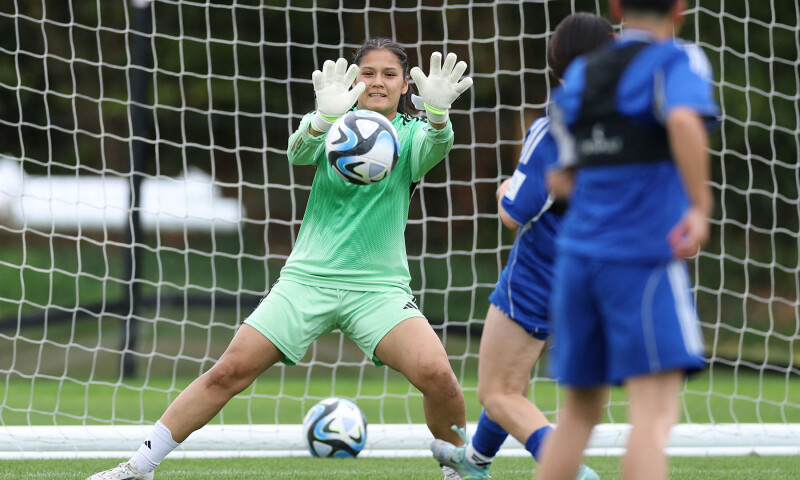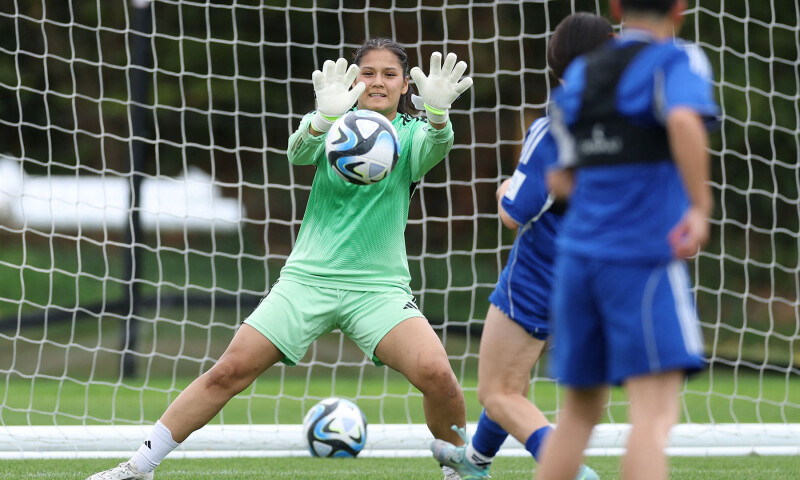

The global ID camp is part of FIFA’s efforts to build a 23-player squad for international friendly tournaments.
Elaha Safdari was 17 and had just earned her maiden call-up as a goalkeeper for Afghanistan’s women’s football team when she was forced to flee Kabul during the Taliban takeover in 2021.
Safdari was given chilling instructions to burn her kit and trophies, and erase her social media profile — anything that could link her to playing football.
“Because it might put you at a high risk (with) the Taliban, because in Afghanistan, women cannot play football,” Safdari told Reuters, fighting back tears.
Four years later, the sound of laughter and the thud of footballs echoed across a pitch tucked away at St George’s Park in west-central England this week, as world soccer’s governing body FIFA held an ID camp for an Afghan refugee team.
Safdari said the week was “emotional, full of love and joy.”
The camp was a chance to reconnect with teammates who share not just a love of the game, but a history of heartbreak and resilience. It was also a declaration of resistance.
“We want to use football as a powerful platform to represent the girls in Afghanistan, that we are not forgetting them,” said defender Najma Arefi, who was 18 when she fled Kabul.
“A dog on the street has more rights than a woman in Afghanistan. It makes me so emotional to talk about (female friends and family still there), the fact that they lost their dreams, they lost everything.
“We want to show the world that even if you’re closing your eyes, we’re still here. We’re still going to speak about them. We are not afraid.”
The global ID camp, the last of three led by coach Pauline Hamill, was part of FIFA’s efforts to build a 23-player squad for international friendly tournaments.
While FIFA President Gianni Infantino called the initiative an “important step in the right direction,” Safdari said Afghan women will not stop fighting for full international status.
“I was so close to my dream, and the Taliban took my dream away,” Safdari said.
“It’s a wonderful step from FIFA that they (are organising) these tournaments, but our aim is bigger. We are asking FIFA to allow us to be recognised and play on the international stage and represent our country in exile.”
Women’s sports
Unlike Afghanistan’s men’s team who continue to play under the national banner, the Taliban-controlled Afghan Football Federation has banned women’s sports.
While Safdari and Arefi found safety in Doncaster, England, their move was fraught with isolation and language barriers. Neither spoke English when they arrived.
“It was a tough journey,” said Safdari, who lives with siblings as her parents are still in Afghanistan.
“Being a refugee in England wasn’t easy. I couldn’t speak the language, it was a new society, and I felt like I had no one to support me.
“But, little by little, football gave me the strength and power to build up again.”
Arefi, who hopes to be a human rights lawyer, said she had always found solace in football.
“It was a way to feel free, leaving every struggle that we had in our life behind,” added Arefi, who won a national championship in 2021 with Herat City.
“On the pitch, there was passion, joy and freedom that was keeping us going.”
Safdari clutched a goalkeeping trophy and an Afghan shirt, treasures her parents managed to ship to her.
“When I look at this jersey, I’m telling myself I’m playing for all the women and girls told to be silent,” she said.
“Every time I wear my boots on the pitch, I’m playing for all those women who can’t even go for a walk the very basic human rights.”
Hamill said the opportunity to coach the team has had her pinching herself.
“When the opportunity comes to really make a difference, I think that you have to grab it with both hands,” said the former Scotland international.
“Thinking about what the players have been through really just immediately connects you with them, where you really want to support them and be part of giving them an amazing experience in football.
“They’re alive on the pitch, it’s their happy place, they get to do something they love.”
Header image: Elaha Safdari of the Afghan Women’s Refugee team makes a save during a selection camp at St. George’s Park, Burton upon Trent, Britain on August 26, 2025. — Reuters




